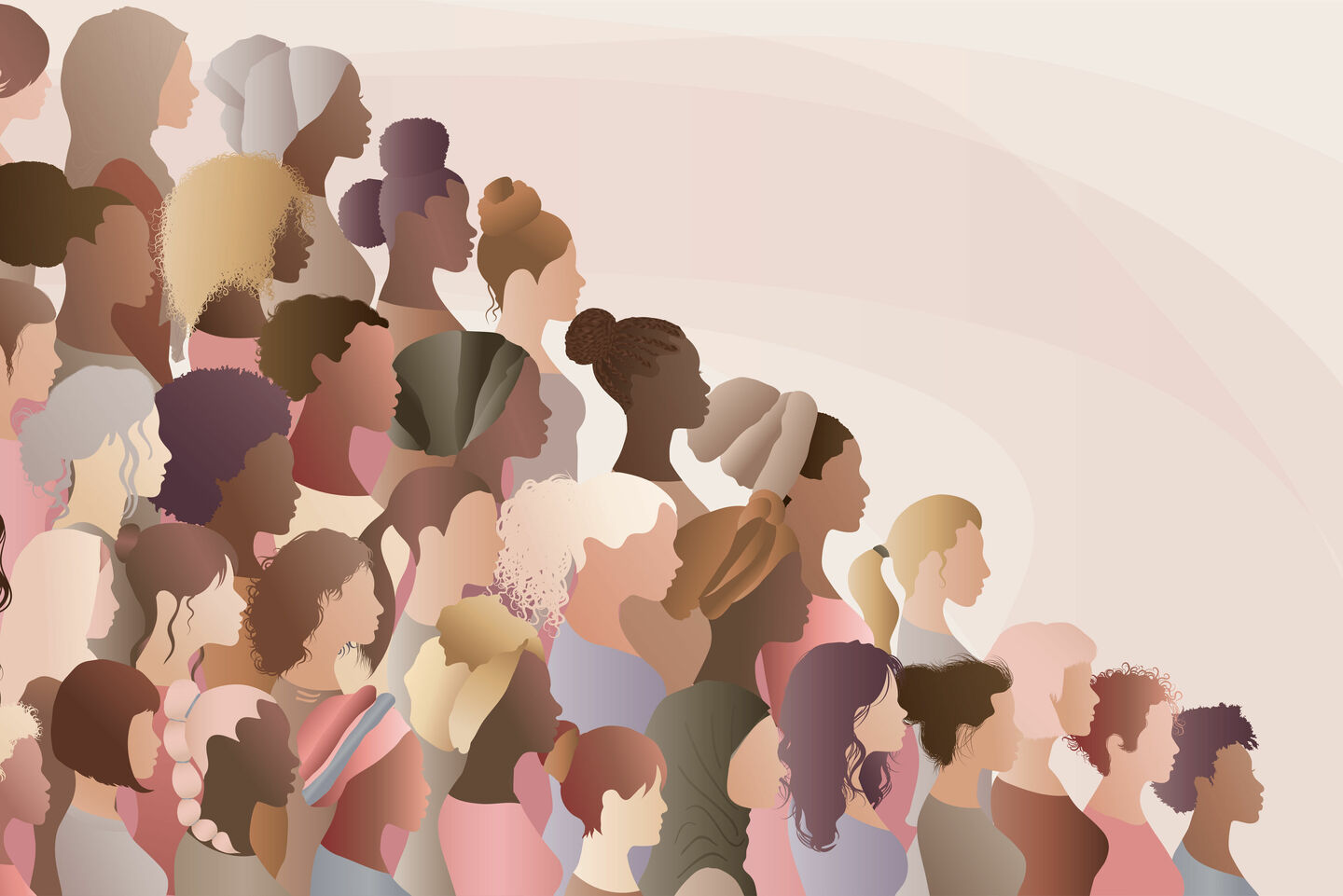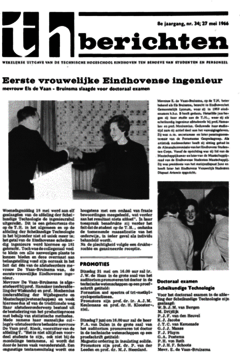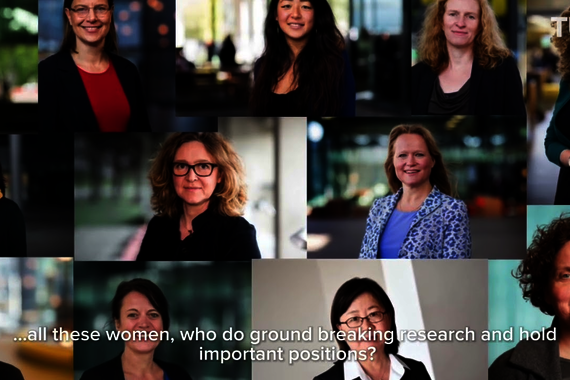
"It’s still hard to cast off the image of men running the academic world"
Women’s emancipation at the TU/e: a timeline
This International Women’s Day, Cursor would like to put women’s rights at TU/e in the spotlight. Ever since the first woman student enrolled in 1957, a lot has happened in this area. Time to look back and look ahead; we may have made a lot of progress, but we’re not there yet.
Roaming the halls of the university, it’s not that obvious. Technology programs and institutes may not have shaken off their it’s-a-man’s-world image completely yet, but the number of female and male students appear equal at first sight. The latest enrolment figures provide a more nuanced picture, however, revealing that 72 percent of all current students are male and 28 percent are female. The latter percentage didn’t go up in the past three years.
Having said that, the number of female students did sharply increase in what’s almost been 67 years. On the occasion of this International Women’s Day, Cursor composed a timeline to highlight TU/e’s accomplishments when it comes to women’s rights and, perhaps even more importantly, what tasks in this area still await the university.
The first student
The first female student was nineteen when she enrolled in the electrical engineering program of what was then called the Technische Hogeschool Eindhoven (THE) in 1957. Her name was Henny van der Leeden, daughter of Professor of Physics P. van der Leeden, who would go on to become rector magnificus. In 2006, she was interviewed about her time as a student by local daily Eindhovens Dagblad. One of the things she says is that she quit the program a year and a half in, after passing her propaedeutic exam. “I fell in love and couldn’t really focus any more. I was never that hardworking to begin with. I also thought it would be unfair for me to continue studying while my brothers were dying to as well, because it cost a lot of money.”
Van der Leeden would later work for Philips as a programmer, until she was laid off during the infamous Operation Centurion, a largescale reorganization within the company. Her whole department was terminated. In the interview, she describes this as the ‘art of living’. It taught her resilience. She subsequently worked as a medical journalist, specializing in diabetes and the brain condition ME.
The first engineers
Five years later, in 1963, the first woman in history completed her engineering degree at the university, according to the TU/e encyclopedia. Rita Blom-Fuhri Snetlage studied partially in Eindhoven and partially in Delft. The first woman to take the entire engineering program in Eindhoven was Els de Vaan-Bruinsma in 1966. In the archives of TH Berichten, the newspaper that merged into Cursor in September 1986 (coinciding with THE being renamed TU/e), it can be read how she received her diploma in an auditorium packed to the brim with interested parties. In her word of thanks on behalf of the entire class of ‘86, she briefly talks about her being a woman.
Other women firsts
Four years later, Wil Visscher is the first woman to obtain her PhD from THE, for the dissertation ‘An electrochemical and optical investigation of the anodic oxygen film on platinum’. In 1959 she had already been appointed as scientific civil servant at the university. As an assistant to Professor Hoogland, she was involved in developing lectures and building the electrochemical practicum. She would remain affiliated to the Department of Chemical Engineering and Chemistry until her retirement.
Other female scientists followed suit. Helga Fassbinder, for example, was the first woman in TU/e history to be appointed to a full professorship in 1976. In 2006, Mary Fanett Wheeler (University of Texas) became the university’s first female honorary doctor. And in 2023, the university welcomed its first female rector magnificus in Silvia Lenaerts.
It shocks me that I’m still the first woman, and I will work hard to inspire more women to assume responsible positions too
In an interview Cursor held with her before she took office, Lenaerts said the following about this: “It shocks me that I’m still the first woman, and I will work hard to inspire more women to assume responsible positions too. When I started working after graduating in Chemistry, I was the first woman. Throughout my career, I’ve often been the first or only woman. And now, once again.”
The most recent figures on the university’s workforce show that there are currently 57 women full professors, as well as 37 women associate professors and 155 women assistant professors.
Dolle Mina’s in the Senaatszaal
You can’t talk about women’s rights in the Netherlands without mentioning Dolle Mina. In the seventies, this feminist action group fought for equal rights for women. On May 12, 1970, they were on campus, entering a packed-out Senaatszaal with their children. Not just to protest, but above all to show their support during Jan Blom’s PhD graduation ceremony.
In his dissertation, he emphasized the importance of Dolle Mina because of the protocol for women during PhD ceremonies. Women could only wear a skirt with a white vest and a white tie. Oftentimes, female PhD candidates received hardly any attention at all. “Both of those options serve to justify the existence of the Dolle Mina group,” his conclusion read, as cited in the archives of magazine De Tijd.
Special treatment
The rise in the share of women at TU/e is partly thanks to the various recruitment initiatives and campaigns focusing on women. The first plans for this kind of campaign were drafted by Rector Magnificus F.N. Hooge in 1985, resulting in the ‘THEA studies technology days' (or ‘THEA days’ for short).
The recruitment event turned out to be a huge success a year later, when over seven hundred girls attended. According to the university’s encyclopedia, it even necessitated the creation of a waiting list of another three hundred interested girls. The THEA days continue to take place until the beginning of the nineties. An exclusive pre-orientation for women, created at the same time, was less successful: women didn’t want to receive special treatment.
Disproportionate
The most recent initiative to get more female scientists to come to the university was also met with criticism over special treatment for women. In 2019, TU/e made the national news when it announced it would only open up vacancies for academic staff to women. The measure was part of the Irène Curie Fellowship (ICF).
The program was discontinued a year later, because the College for Human Rights (CHR) deemed the approach to be disproportionate. It turned out to be successful nonetheless: 35 new women were appointed to a range of academic positions, doubling the number of female academic staff members and bringing their share in this ambit to 25% overnight.
The program was subsequently continued in a different form, including an initial assessment of the existing male/female ratio. If the percentage of women is under 35, the vacancy is brought under the program, which is to run for the rest of this year in any case.
Chief Diversity Officer Evangelia Demerouti was closely involved in setting up the program. When the CHR took the program to court she was ‘excited in a good way’. In her opinion, it came down to ethics. “On paper you can’t exclude any groups, which is why the policy was rejected. At the same time, they were positive about defending the interests of disadvantaged groups, in this case women. In the end the CHR also helped us figure out how we could run the program.”
Demerouti hopes the program is extended. “If only because of the symbolical nature of the program it would be a step backwards if the university discontinued it.” Demerouti thinks this would be detrimental to the male/female ratio at the university. “If you stop now, you’re basically saying women’s rights have become less important.”
Done in 400 years
The aforementioned report by the Dutch Network of Women Professors (LNVH) contains a call for a new impulse to accelerate the equalization of the male/female ratio for full professors. To this end, the organization is working together with Athena’s Angels, an initiative by four full professors who’ve made it their mission to stand up for women in academia. In 2017, the minister of Education, Culture and Science at the time already made five million euros available to appoint a hundred women full professors. This impulse had an effect, but this seems to be slowly subsiding now, the initiators say.
According to the LNVH’s prognosis, an equal male/female among full professors would only be achieved in 2045 if we proceed at the current pace. The initiators would prefer to make this a reality by 2036. “To accomplish this, two hundred extra women full professors must be appointed in the time ahead,” the report reads. The target year isn’t a coincidence, by the way, as in 2036 it will be exactly four years ago since the first woman student was admitted to a university in the Netherlands. It concerned Anna Maria van Schurman, who studied at the university in Utrecht in 1636, to be exact. Right now talks about this new impulse have been paused due to the outgoing status of the Dutch cabinet office.
“The fall of the cabinet office could hardly have come at a worse time for our call,” says Lidwien Poorthuis, managing director of the LNVH. “We do see the attention for gender inequality is there, as is the momentum. So even without the impulse we’re going for parity in 2036.” According to Poorthuis, the biggest stumbling block is formed by the prejudices that prevail in the world of science. “The limited idea of what quality of science is, that one mold that everyone must fit and that excludes a huge amount of different talent. This doesn’t only apply to women, but also to other people that don’t align with this idea. There are still people with a relatively large amount of power who are calling the shots and who aren’t being held accountable for the impact of those prejudices. This means the system is perpetuating itself.”
Poorthuis also thinks the TU/e should get to work on its problems getting women in the door. “The university has to look at the pond it’s fishing in. As opposed to the non-technological universities, they’ll need to come up with a different flight path. It actually already starts in primary and secondary education, where you already see prejudices about women and technology programs. That’s what the university should look at, as well as at how it defines quality of science and how it draws up its own job profiles. And all of this must take place, as it does at any other university, making its culture more inclusive, because otherwise everyone you bring in will just end up leaving again.”
Transition
If you look at TU/e’s latest targets for gender equality, you’ll see that the university is facing a significant challenge. For instance, it aspires for 35 percent of assistant professors to be female by 2025. This number is 30 percent for associated professors and 25 percent for full professors. In addition, the university wants to have 30 percent female students. Right now, only the target for assistant professors has been achieved.
Evangelia Demerouti vividly remembers starting out as a Chief Diversity Officer in 2017. Alone. With the help of a single colleague, who worked parallel to her usual tasks, she put diversity in the widest sense of the word on the agenda. “We worked hard to even out the male/female ratio.” Demerouti isn’t only referring to the ICF, but also to what she sees happening around her. “Nowadays I see all kinds of people pushing for diversity and inclusion. I’m no longer working on this alone. I can’t tell you how great that feels. The issue is receiving loads of attention.”
And yet, there’s plenty to do still. “We’ve brought many women in, but that’s not the end of story: they obviously have to stay as well. Women sometimes leave because they are made to feel like they were only hired because they’re women. So we still have some ground to cover when it comes to creating an environment where they’re treated fairly and feel welcome. We can do a better job recognizing and appreciating them. Supervisors have to take responsibility in this respect: they have to create a safe environment and encourage them to find their own path.” Together with colleagues, Demerouti developed an online training course to further inclusive and empowering leadership. The course will be freely available as of next week.
But that responsibility needs to be felt at every level within the university’s hierarchy. “We have to ensure that processes like selection, onboarding, advancement, and evaluation become fairer. It goes without saying that a woman with three children needs to be evaluated differently from a sixty-year-old man.”
This is why Demerouti hopes even more people at the university will get involved in this topic. A while ago she already launched a call for appointing diversity ambassadors at every department. This didn’t take off because every professional field ‘lives in a different reality’. Now she’s doing it again: “You can only increase diversity and inclusion if more people get involved in implementing the policy. It still happens very often that I’m the only one at a meeting who can bring up the subject, whereas finances can always be talked about. It shouldn’t depend on my presence whether diversity and inclusion are discussed.”
At the same time, Demerouti is cautious when it comes to the speed with which women in academic positions are receiving more recognition and appreciation. “We’re in a transition and on the move, people are noticing that diversity is important for a team to function and that a strict hierarchy and bureaucracy aren’t beneficial to diversity, but everything’s progressing at a steady pace. It’s still hard to cast off the image of men running the academic world.”
Watch the video below on 67 years of women’s emancipation at TU/e.






Discussion